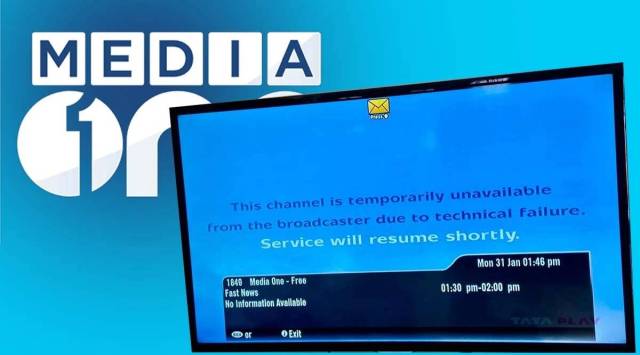QUASHING the Centre’s order banning the broadcast of Media One, a Malayalam news channel, the Supreme Court Wednesday said the Union of India had raised the claim of national security in a “cavalier manner” to refuse renewal of licence and said the denial of security clearance to a channel for its views produces “a chilling effect on free speech and particularly on press freedom”.
The Supreme Court set aside the January 31, 2022, order of the Ministry of Information & Broadcasting (MIB) which cited the denial of security clearance by the Ministry of Home Affairs (MHA) as the reason for refusing to renew the channel’s licence. A bench chaired by Chief Justice DY Chandrachud said “national security claims cannot be made out of thin air”.

The apex court bench also set aside the Kerala High Court judgement of March 2, 2022, that upheld the I&B Ministry’s order. On the High Court’s decision to rely on material disclosed solely to it by MHA in a ‘sealed cover’, to which Media One did not have access, Senior Advocate Dushyant Dave, who represented Madhyamam Broadcasting Ltd (owners of Media One) said this “negated the principles of natural justice”. “This procedure is violative of the principle of an open court and of fairness to parties,” he argued.
In its judgement, the Supreme Court said, “The critical views of the channel, Media One, on policies of the government cannot be termed ‘anti-establishment’. The use of such a terminology in itself represents an expectation that the press must support the establishment. The action of the MIB by denying a security clearance to a media channel on the basis of the views which the channel is constitutionally entitled to hold produces a chilling effect on free speech and particularly on press freedom.”
Referring to the “sealed cover” procedure, the Supreme Court said such proceedings “infringe the principles of natural justice and open justice” and added that the courts could adopt the less restrictive public interest immunity proceedings where only redacted portions are given to the parties”. “It was not intended that the sealed cover procedure shall replace public interest immunity proceedings which constitute an established method for dealing with claims of confidentiality. The sealed cover procedure cannot be introduced to cover harms that could not have been remedied by public interest immunity proceedings,” the CJI-led bench said.
The Supreme Court said that in the affidavit to the Kerala High Court as well as in the submissions made before it, the Centre made no attempt to explain how non-disclosure of the material (based on which the action was taken) would be in the interest of national security. The government, it said, “has adopted this approach in spite of reiteration by this court that judicial review would not be excluded on a mere mention of the phrase national security. The state is using national security as a tool to deny citizens remedies that are provided under the law. This is not compatible with the rule of law.”
The judgement said, “While we have held that it would be impracticable and unwise for the courts to define the phrase national security, we also hold that national security claims cannot be made out of thin air. There must be material backing such inference.” In the Media One case, it said, “The material on the file and the inference drawn from such material have no nexus.”
Story continues below this ad
While the court agreed that “national security is one of the few grounds on which the right to a reasonable procedural guarantee may be restricted”, it observed that the mere involvement of issues concerning national security would not preclude the state’s duty to act fairly. “If the state discards its duty to act fairly, then it must be justified before the court in the facts of the case. Firstly, the state must satisfy the court that national security concerns are involved. Secondly, the state must satisfy the court that an abrogation of the principles of natural justice is justified. The state has to now prove that these are the two purposes that the state action seeks to serve,” it said.
The court pointed out that the MHA in response to the channel’s request for disclosure of reasons for denial of security clearance had said that “the reasons cannot be disclosed because reports from investigative agencies are secret in nature”. “To argue that the reports of intelligence agencies may contain confidential information is one thing but to argue that all such reports are confidential is another. Such an argument is misplaced and cannot be accepted on the touchstone of constitutional values. The report by investigative agencies impact decisions on the life, liberty and profession of individuals and entities. And to give such reports absolute immunity from disclosure is antithetical to a transparent and accountable system,” the Supreme Court said.
ExplainedProtecting citizen rights
The Court has reiterated that national security cannot be used in a casual manner to deny citizens their rights. It said while it would be unwise for the court to define national security, this cannot be used as a tool to deny citizens remedies under law.
The bench said that the “sealed cover” procedure followed by the single judge and the division bench have necessarily left the appellants without the right to writ remedies which have been described as the “heart and soul of the constitution and a basic feature of the Constitution”. “The appellant’s right to writ remedies has been denied through a formalistic order by the High Court,” the judgement said, adding “the procedure that was followed by the High Court has left the appellants in a maze where they are attempting strenuously to fight in the dark.”
The court held that “non-renewal of permission to operate a media channel is a restriction on the freedom of the press which can only be reasonably restricted on grounds laid down in Article 19(2) of the Constitution”. Elaborating on press freedom, it said, “An independent press is vital for the robust functioning of a democratic republic. Its role in a democratic society is crucial for it shines a light on the functioning of the state. The press has a duty to speak truth to power and present citizens with hard facts enabling them to make choices that propel democracy in the right direction. The restriction on the freedom of the press compels citizens to think along the same tangent. A homogenised view on issues that range from socio-economic polity to political ideologies would pose grave dangers to democracy”.
Story continues below this ad
On the MHA denying security clearance on the ground that the channel had links with Jamaat-e-Islami-Hind (JEIH), the Supreme Court said, “When JEIH is not a banned organisation, it will rather be precarious for the state to contend that links with the organisation would affect the sovereignty and integrity of the nation, the security of the state, friendly relations with foreign states or public order.” It said there was no evidence on record to show the channel shareholders are sympathisers to JEIH and hence “the purpose of denying security clearance clearance, does not have a legitimate goal and a proper purpose”.









